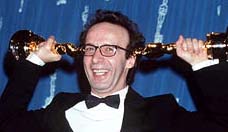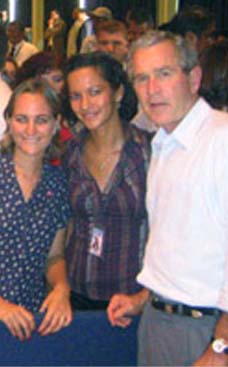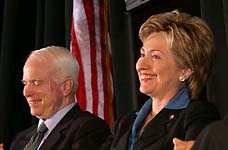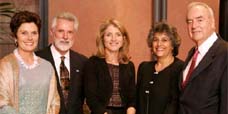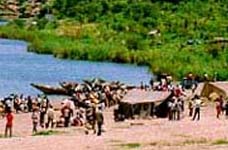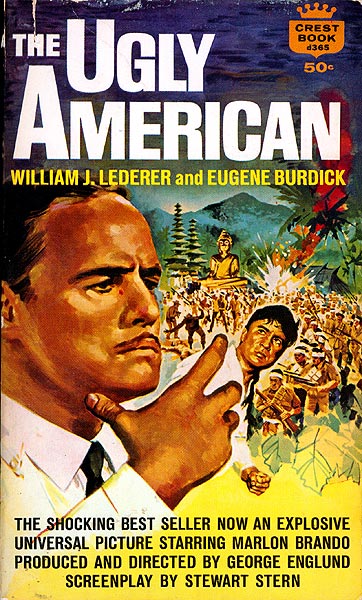
The Ugly American takes place in the imaginary kingdom of Sarkhan and presents itself as a serious critique of the State Department. It portrays the diplomatic service as divided between hacks, and the heroes whose good works they undermine. It attributes America’s “defeats” in the cold war to diplomatic incompetence. Its thesis is that our losses can be reversed by making comprehensive reforms in the State Department and its personnel.
"The Ugly American" helped inspire Peace Corps
Books: Burdick and the Ugly American: The Novelist as Propagandist By PHIL McARDLE Special to the Planet
Eugene Burdick (1918-1967) was a professor of political science at the University of California and the author of The Ugly American and other best-selling novels. He was described to me years ago as “a cigar smoking extrovert.” At the time of his death, Clark Kerr spoke of him as “...one of the truly blithe spirits of the university—joyous, curious, friendly, creative, helpful.”
Born in Sheldon, Iowa, and raised in Los Angeles, he graduated from Stanford in 1941 with a degree in psychology. After service in the Navy he returned to Stanford for graduate studies in political science. He had learned, he wrote, that “the big problems couldn’t be solved by watching rats and that I’d better study humans.”
In 1948 he received a Rhodes Scholarship and earned a doctorate in political philosophy at Magdalene College, Oxford. When the Korean War broke out he was called back into military service; he spent his tour of duty “war-gaming and teaching political philosophy” at the Naval War College in Rhode Island. War-gaming, with its emphasis on hypothetical scenarios, appears to have had a profound effect on the fiction he wrote. In 1952 he began teaching at Berkeley.
Powerful universities
When Burdick attended Oxford, that ancient university was making a vigorous recovery from the effects of World War II. Dons like J. R. R. Tolkien, C. S. Lewis, and Maurice Bowra were in top form. Their students included youngsters from the public schools, veterans, Commonwealth scholars, and increasing numbers of young women. Many of Burdick’s classmates late distinguished themselves as artists, writers, scientists and politicians.
Some political philosophers might have found Oxford a great place to study politicians “in embryo.” But Burdick looked around and wrote an article for Isis, the student magazine, announcing that Oxford was in a serious state of decline, “even though still a powerful university, probably the most powerful in the world.” English students took umbrage, and a lively epistolary squabble ensued. It raised enough of a ruckus to be covered by American magazines and newspapers.
Twelve years later, in 1962, Burdick came back to the subject of “powerful” universities in an article for the New York Times Magazine, “Colossal U. by the Pacific.” It was a paean of unqualified praise for the University of California, which he described as “Midas-rich, dinosaur-big, ceaselessly engaged in a fantastic variety of tasks.” He asserted it had “solved the great problem of combining size with excellence,” while providing excellent instruction for its students.
The student protest movement burst into flame two years later. Although civil rights activists in the Free Speech Movement struck the initial spark, many observers believed the tinder that turned an incident into a conflagration was the university’s severe neglect of undergraduate teaching.
The Ugly American
Student protest soon focused on the war in Vietnam, a “big problem” about which Burdick had written in The Ugly American (1958). This famous novel—a collaboration with William Lederer, a retired naval officer—was a plea for American involvement in French Indochina, as Vietnam was known then. It was inspired, in part, by the ideas and actions of a charismatic soldier, Colonel Edward Lansdale. (Graham Greene portrayed Lansdale, the chief of the CIA’s Saigon military mission, as a bad guy in his 1954 novel, The Quiet American.)
The Ugly American takes place in the imaginary kingdom of Sarkhan and presents itself as a serious critique of the State Department. It portrays the diplomatic service as divided between hacks, and the heroes whose good works they undermine. It attributes America’s “defeats” in the cold war to diplomatic incompetence. Its thesis is that our losses can be reversed by making comprehensive reforms in the State Department and its personnel.
The need for specific reforms is illustrated by scenarios such as might have been concocted for role playing exercises at the Naval War College: an American soldier urges his French peers to borrow guerilla warfare methods from the Vietminh; a diplomat’s affair with a Chinese woman leaves him too tired to negotiate effectively; a plain-spoken American engineer (the heroic “Ugly American” of the title) works with his Sarkanese opposite number to devise an inexpensive irrigation method. Simple vignettes show the consequences of American rudeness and inability to speak local languages.
The book generates an atmosphere of intense foreboding, and its endless, superficially accurate details give it the appearance of authenticity. As its ambassador to Sarkhan writes to the secretary of state, “The United States must either prepare itself to win these many tiny conflicts, which are the substance of competitive coexistence; or go down to defeat... The little things we do must be done in the real interest of the peoples whose friendship we need—not just in the interest of propaganda.”
But crucial aspects of the real situation in Vietnam were completely absent from The Ugly American. It ignored President Eisenhower’s prudent decision not to intervene militarily. It misrepresented the extensive American involvement in the country’s affairs that already existed. It seemed naively unaware of what many other observers knew or suspected—that our government had already spent millions of dollars in secret funds to support the French war effort.
By the time The Ugly American appeared in 1958, its proposals for Peace Corps-style, citizen-to-citizen interaction were wholly inappropriate. When the novel was turned into a movie in 1962, events had so far outstripped the plot that the story had to be revised extensively as it was being filmed. The country was a war zone and our armed forces had begun replacing the French.
Still, Burdick’s ideas had such appeal to American good will and missionary zeal that they lingered in the air long after they stopped making sense, and were even incorporated into our war effort. A disillusioned Special Forces officer once told me of his experience in applying those ideas. In 1968 he was given responsibility for an outpost in the highlands, 300 miles northwest of Saigon, near the Cambodian border. The outpost and the adjacent village were home to about a thousand men, women and children, including three different tribes of mountain people, Cambodian exiles, and Vietnamese and American troops.
He was there to fight the Viet Cong. To succeed, he needed intelligence from the local people, but they were afraid of the American and South Vietnamese Special Forces. To win their confidence he began a “civil affairs program,” much in the fashion advocated by The Ugly American. Over a period of months his men won the villagers’ trust by helping them dig wells and rebuild their school, and by giving them medical care at the post hospital. He said it made him feel good to see people who had been afraid of his troops smiling when they met. And the program worked: villagers started supplying information about the Viet Cong.
All of this ended when an American howitzer shell fell short of its target during a fire fight, hitting the village and killing five people, including two children. Fear of the Special Forces returned instantly. Three days later, a soldier found a time bomb in the hospital, and he had to issue orders breaking off contact with the village.
He came to realize he had manipulated the villagers for the sake of his mission, using them in “a cruel game of deception.” He said, “My desire changed from wanting to cultivate a source of military information to helping human beings in need.” He gave them the materials for building their own dispensary, and carte blanche to do as they wished.
But V.C. attacks continued relentlessly, the village became a battlefield, and the villagers either died or moved away. “Eventually,” he said, “we realized that the reason for the attacks was that we were there—without us, the V.C. would not have been interested in the village.”
That was how Burdick’s scenarios played out in reality. “The little things” he and Lederer (and behind them, Lansdale) urged Americans to do in the people’s “real interest” were never genuinely disinterested. Whether you think in terms of the golden rule or the categorical imperative, this was deeply immoral.
Eugene Burdick considered his role as a political thinker to be more important than his role as a writer of fiction. In an essay for The Reporter he wrote, “The artist is responsible only for the fragment of reality he chooses to work on, but the political theorist is responsible for some sort of overview, and it is a dread responsibility.”
In The Ugly American, however, those roles coalesced: he used his talent as a novelist to create an “overview” of Vietnam which was propaganda for grossly mistaken “big ideas.” The “fragment of reality” he wrote about was of extraordinary importance to an entire generation of Americans. He misinformed them by contributing half-truths to their understanding of the world. He muddied the waters so completely that some of his readers still have trouble seeing the Vietnam war for what it was.
He was not alone in muddying the waters, and of course this still goes on. Policy makers today appeal to what Theodore White called our “blind good will” to justify sending our troops to fight in places where we should not be at war.
